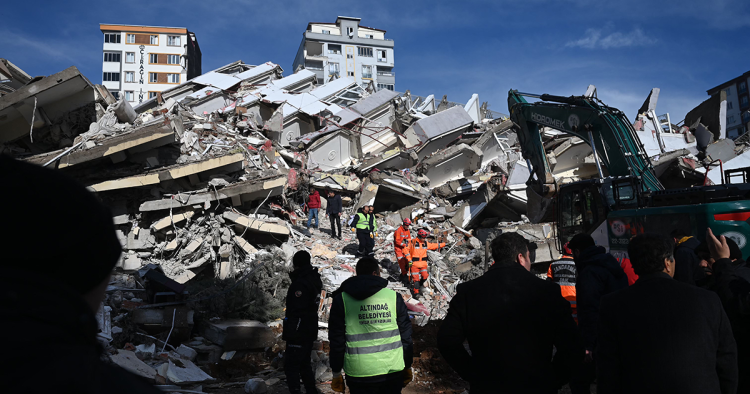The earthquakes that shook Turkey and Syria in the early hours of Feb. 6 represent a shocking human tragedy, with casualties already in the thousands. Hundreds of thousands, if not millions, have been rendered homeless in the cold and wet of winter. There is no overstating the human suffering that the earthquakes have caused. This natural disaster is, at the same time, a clear political test for the current Justice and Development Party (AKP)-Nationalist Action Party (MHP) government, one that will gauge its efficacy and legitimacy only months before critical elections, set to be held on May 14.
There is little doubt that President Recep Tayyip Erdoğan and his allies recognize this. The bumbling failure of the Turkish government in the wake of the 1999 Gölcük Earthquake played a key role in softening support for his predecessors, helping to create the political opening that the AKP stepped into in 2002. The AKP, after all, did not win its first victories promising Islamism and international belligerence, but rather good governance and transparency. They promised competence, not revolution.
That competence has not been much evident in the first hours since the earthquake. Thousands of building have collapsed, laying bare the slipshod construction that has marked Turkey’s building boom and making a mockery of the “earthquake proofing” and regulations that were meant to guide new Turkish buildings. Special “earthquake taxes” seem to have been misappropriated; certainly, the government has little to show for them. Corruption and, especially, cozy ties between the government and friendly construction firms have meant that those regulations have been largely ignored.
With basic infrastructure severely damaged, Erdoğan’s failure to fully mobilize the military to help ensure the distribution of food and clothing to survivors seems unfathomable. Retired generals have publicly complained that the government has stopped allowing troops to train for disaster response and the government’s own emergency response agency, run through the Interior Ministry, is badly overwhelmed. Social media is filled with desperate calls for aid. Turkish citizens are naturally wondering why the full strength of the much vaunted state is not put into action.
While calling for national unity and a week of mourning for the victims of the disaster, Erdoğan has not been able to stifle his partisan instincts. On the morning of Feb. 6, he made calls offering support to AKP municipalities, but seems to have neglected to call the leadership in opposition-controlled ones. On Feb. 7, he gave a televised speech in which the tone was less reassuring than an angry diatribe against critics of the government’s response. Later the same day, the Istanbul State Prosecutor initiated the first criminal investigations into journalists who had the temerity to make criticism public. If this is the direction the government will be taking, its prosecutors are going to be very busy indeed.
As in 1999, Turkish civil society is showing its energy and creativity, with every element of Turkish society working to bring aid to their fellow citizens. The question is whether the Turkish government can do the same. There is no undoing the failures in regulating construction over the past two decades. The failure to immediately mobilize the military to rebuild infrastructure has clearly cost valuable time and many lives. Nonetheless, a demonstration of efficiency and transparency in the coming weeks and months could do much to defang anger at those failures. The crisis facing Turkey is truly monumental, hampered by broken infrastructure and winter weather. Nonetheless, the Turkish government must rise to the challenge, for the sake of its citizens, and, perhaps, to ensure its own political future. Erdoğan knows this. The question is whether he can do it.
Howard Eissenstat is a non-resident scholar with MEI's Turkey Program and an associate professor of history at St. Lawrence University, where he teaches courses on Middle East history and politics.
Photo by OZAN KOSE/AFP via Getty Images
The Middle East Institute (MEI) is an independent, non-partisan, non-for-profit, educational organization. It does not engage in advocacy and its scholars’ opinions are their own. MEI welcomes financial donations, but retains sole editorial control over its work and its publications reflect only the authors’ views. For a listing of MEI donors, please click here.













